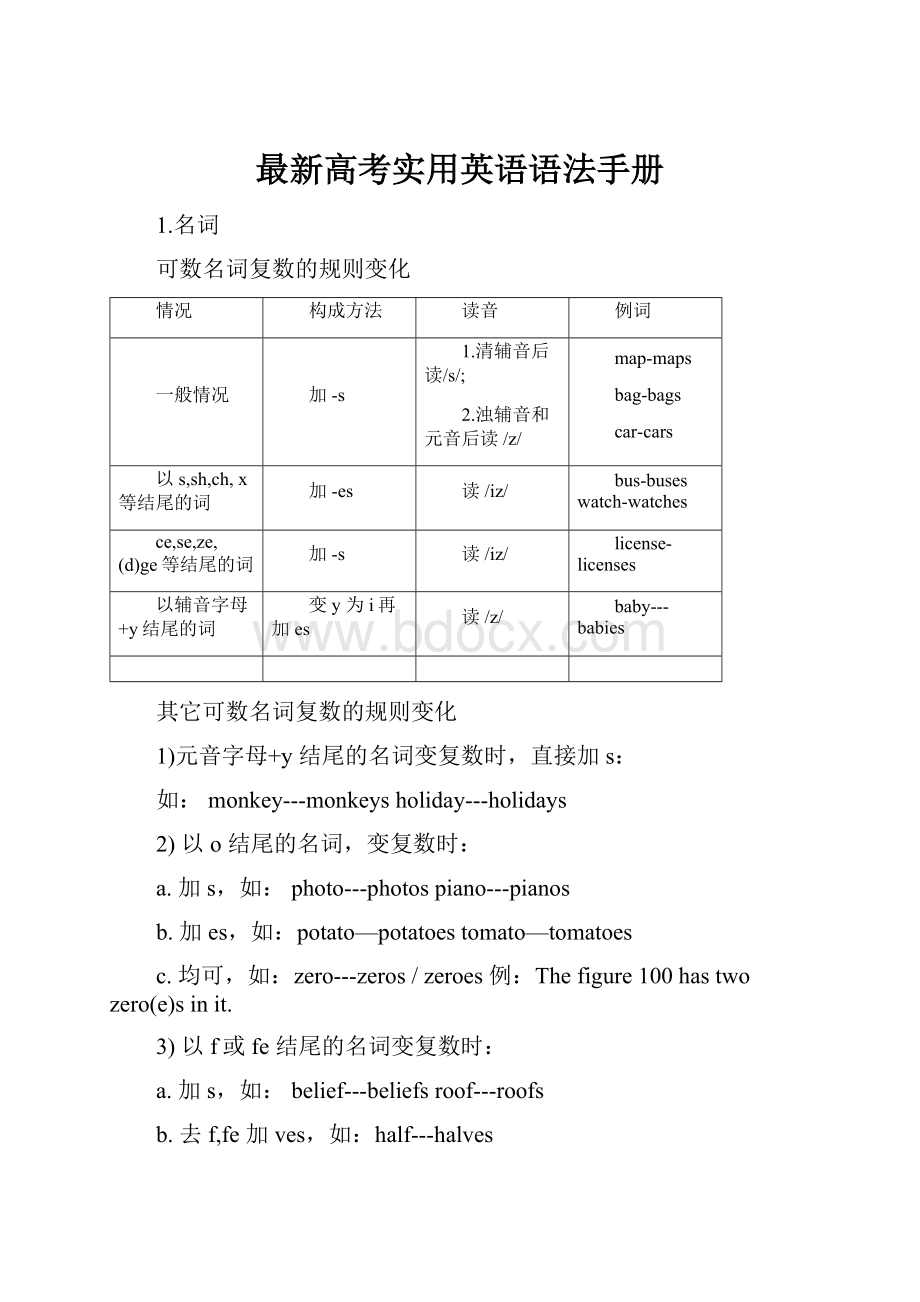最新高考实用英语语法手册.docx
《最新高考实用英语语法手册.docx》由会员分享,可在线阅读,更多相关《最新高考实用英语语法手册.docx(82页珍藏版)》请在冰豆网上搜索。

最新高考实用英语语法手册
1.名词
可数名词复数的规则变化
情况
构成方法
读音
例词
一般情况
加-s
1.清辅音后读/s/;
2.浊辅音和元音后读/z/
map-maps
bag-bags
car-cars
以s,sh,ch,x等结尾的词
加-es
读/iz/
bus-buseswatch-watches
ce,se,ze,(d)ge等结尾的词
加-s
读/iz/
license-licenses
以辅音字母+y结尾的词
变y为i再加es
读/z/
baby---babies
其它可数名词复数的规则变化
1)元音字母+y结尾的名词变复数时,直接加s:
如:
monkey---monkeysholiday---holidays
2)以o结尾的名词,变复数时:
a.加s,如:
photo---photospiano---pianos
b.加es,如:
potato—potatoestomato—tomatoes
c.均可,如:
zero---zeros/zeroes例:
Thefigure100hastwozero(e)sinit.
3)以f或fe结尾的名词变复数时:
a.加s,如:
belief---beliefsroof---roofs
b.去f,fe加ves,如:
half---halves
c.均可,如:
handkerchief:
handkerchiefs/handkerchieves
可数名词复数的不规则变化
1)child---childrenfoot---feettooth---teeth
mouse---miceman---menwoman---women
注意:
与man和woman构成的合成词,其复数形式也是-men和-women。
如:
anEnglishman,twoEnglishmen.但German复数形式为Germans
2)单复同形如:
deer,sheep,fish,Chinese,Japanese,li,jin,yuan
3)集体名词,以单数形式出现,但实为复数。
如:
people,police,cattle
4)以s结尾,仍为单数的名词,如:
maths,politics,physics,news,theUnitedStates,theUnitedNations,boss
5)表示由两部分构成的东西,如:
glasses(眼镜)trousers,clothes,pants裤子,shorts短裤glasses眼镜,compasses圆规,scales天平,pliers钳子,clips剪子,trafficlights交通灯(一般有三盏,这样理解)sports(运动)
若表达具体数目,要借助数量词pair(对,双);suit(套);apairofglasses;twopairsoftrousers
6)另外还有一些名词,其复数形式有时可表示特别意思,如:
goods货物,waters水域,fishes(各种)鱼
常考的不可数名词
单词
意义
短语、例句
advice
建议(“报道、通知”可数)
givesb.someadviceonsth.
somepiecesofadvice
equipment
设备
asetofequipment
experience
经验(注:
“经历”可数)
Mr.Lihasmuchteachingexperience.
exercise
锻炼(注:
“练习”可数)
takeexercise
fun
开心、快乐的事
Whatfunitistodosth.!
furniture
家具
asetoffurniture
news/information
/word
消息,新闻
Wordcamethathewonthefirstprizeinthematch.
baggage/luggage
行李
apieceofbaggage/luggage
progress
进步
makegreat/rapid/some/noprogressinsth.
practice
练习
Practicemakesperfect.
Paper
纸
work
工作
weather
天气
applause
掌声
aburstofapplause一阵掌声
wealth
财富,富裕
friendship
友谊
energy
精力
homework
家庭作业
knowledge
知识
nature
自然
luck
运气
health
健康
technology
技能
time
时间(注:
“次数”可数)
courage
勇气
help
帮助
hope
希望
food
食物
wood
木材
scenery
风景
jewelry
珠宝
poetry
诗歌
evidence
证据
money
钱
名词的格
在英语中有些名词可以加"'s"来表示所有关系,带这种词尾的名词形式称为该名词的所有格,如:
ateacher'sbook。
名词所有格的规则如下:
1)单数名词词尾加"'s",复数名词词尾没有s,也要加"'s",如theboy'sbag,men'sroom。
2)若名词已有复数词尾-s,只加"'",如:
theworkers'struggle工人的斗争,Teachers’Day教师节。
(例外:
boss’s)
3)凡不能加"'s"的名词(无生命的名词),都可以用"名词+of+名词"的结构来表示所有关系,如:
thetitleofthesong歌的名字,thegateofschool,themapofChina
4)如果两个名词并列,并且分别有's,则表示"分别有";只有一个's,则表示'共有'。
如:
John'sandMary'sroom(两间)JohnandMary'sroom(一间)
5)双重所有格。
物主代词不可与a,an,this,that,these,those,some,any,several,no,each,every,such,another,which等词一起前置,修饰一个名词,而必须用双重所有格。
修饰可数、不可数名词的短语
一、只能修饰可数名词的词语有:
many,manya(n),agood/greatmany,a(great/large)numberof,scoresof,dozensof等.例如:
Scoresofpeoplewentthereinthefirstfewdaysafteritsopening.
开张后的头几天,很多人去了那儿.
Ihavebeentheredozensoftimes.
我已去过那儿很多次了.
There’reanumberofstudentsreadingEnglishintheclassroom.
教室里有许多学生在读英语.
Manyastudenthas(=manystudentshave)visitedtheGreatWall.(谓语动词用单数)
很多学生都游览过长城.
Inwinter,agoodmanyanimalssleepunderthesnow.
冬天很多动物在雪下冬眠.
注意:
many所修饰的复数名词前若有限定词,many后面要接of,表示“……中的很多”.例如:
Agreatmany(ofthe)graduateshavefoundjobs.
毕业生中很多人已经找到了工作.
二、只能修饰不可数名词的词语有:
much,agreatdealof,agreat/largeamountof等.例如:
Istheremuchwaterinthebucket?
桶里有很多水吗?
Healwayshasagreatamountofworktodo.
他总是有很多工作要做.
三、既能修饰可数名词又能修饰不可数名词的词语有:
alotof,lotsof,plentyof(以上三个词语后谓语动词的数依of后的名词的单复数而定),agreat/largequantityof(其后谓语用单数),quantitiesof(其后谓语用复数).例如:
Thereisstilllotsofsnowinthegarden.
花园里还有许多雪.
Thereisplentyofrainhere.
这儿的雨水很多.
Agreatquantityofflowerswasplacedinthehall.
大厅里放了很多鲜花.
Therearelargequantitiesoffoodinthecupboard.
橱柜里有许多食物.
四、用于肯定句、否定句、疑问句
在所有这些表示“很多”的词语中many,much是最常用的词,它们既可以用于肯定句,也可以用于疑问句和否定句.例如:
Aretheremanypeopleinthestreet?
街上有很多人吗?
Thereisn’tmuchtimeleft.
剩下的时间不多了.
其它的词语都用于肯定句,日常会话中常用lotsof,alotof或plentyof;正式文体中常用agreatmany,a(large)numberof,agreatdealof,scoresof或dozensof等.但若肯定句中有too,so,as,very或how等词修饰时,则必须使用many,much.例如:
Thenumberofthepeoplewholosttheirhomesreachedasmanyas250,000.
无家可归的人数多达250,000人.
Thereistoomuchworktodo.
要做的工作太多了.
2.冠词
不定冠词的用法
泛指,不确定的人或物。
如 A knifeisatoolforcuttingwith.
1)词组或成语。
a little/ a few/ a lot/ a greatmany/many a /as a rule/in a hurry/in a minute/in a word/in a shortwhile/after a while/have a cold/have a try/keep an eyeon/allof a sudden
2)a/an
a用于以辅音开头的词前;an用于以元音开头的词前
以辅音字母开头不定冠词却用an的单词
anhour;anhonor;anhonestboy
以元音字母开头不定冠词却用a的单词
aunit;auseful/uselessthing;auniversity;auniform;ausualtask;aunitedform;
aEuropean;aone-eyedman;aone-waytrip
定冠词的用法
1)特指双方都明白的人或物:
Take the medicine.
2)上文提到过的人或事:
Heboughtahouse. I’vebeento the house.
3)指世上独一无二的事物:
the sun, the sky, the moon, the earth
4)单数名词连用表示一类事物,如:
the dollar; the fox;或与形容词或分词连用,表示一类人:
the rich; the living。
5)用在序数词和形容词的最高级形式及形容词only,very,same等前面:
Wheredoyoulive?
Iliveon the secondfloor.
6)与复数名词连用,指整个群体:
Theyare the teachersofthisschool.(指全体教师)
Theyareteachersofthisschool. (指部分教师)
7)表示所有,相当于物主代词,用在表示身体部位的名词前:
Shecaughtmeby the arm.
8)用在某些由普通名词构成的国家名称、机关团体、阶级等专有名词前:
the People’sRepublicofChina
9)用在表示西洋乐器的名词之前:
Sheplays the piano.
10)用在姓氏的复数名词之前,表示一家人(或夫妇俩):
the Greens
11)用在惯用语中:
in the day,in the morning(afternoon,evening), the dayaftertomorrow
the daybeforeyesterday, the nextmorning,
in the sky(water,field,country)
in the dark, in the rain, in the distance,
inthemiddle(of), intheend,
on the whole, by the way, goto the theatre
零冠词的用法
1)国名,人名前通常不用定冠词:
England,Mary;
2)泛指的复数名词,表示一类人或事物时,可不用定冠词;
Theyareteachers.
3)抽象名词表示一般概念时,通常不加冠词;
Failureisthemotherofsuccess.
4)物质名词表示一般概念时,通常不加冠词,当表示特定的意思时,需要加定冠词;
Mancannotlivewithoutwater.
5)在季节、月份、节日、假日、日期、星期等表示时间的名词之前,不加冠词;
WegotoschoolfromMondaytoFriday.
6)在称呼或表示官衔,职位的名词前不加冠词;
TheguardstooktheAmericantoGeneralLee.
7)在三餐、球类运动和娱乐运动的名称前,不加冠词如:
havebreakfast,playchess
8)当两个或两个以上名词并用时,常省去冠词;
Ican’twritewithoutpenorpencil.
9)当by与火车等交通工具连用,表示一种方式时,中间无冠词;如:
bybus,bytrain;
10)有些个体名词不用冠词;如:
school,college,prison,market,hospital,bed,table,class,town,church,court等个体名词,直接置于介词后,表示该名词的深层含义;
gotohospital
11)不用冠词的序数词;
a.序数词前有物主代词 That’shisthirtiethbirthday.
b.序数词作副词 Hecamefirstintherace.
c.在固定词组中 at(the)first,firstofall,fromfirsttolast
3.数词
基数词,表示数目多少
序数词,表示顺序和等级
分数的构成:
分子用基数,分母用序数;分子大于1,分母用复数
五分之一onefifth
五分之二twofifths
四分之三threefourths
4.形容词
1、形容词的位置
1)性质形容词有级的变化,可以用程度副词修饰,在句中可作定语、表语和补语。
例如:
anintelligentgirl(形容词+名词)
Wholeftthewindowopen?
(形容词做为宾补)
Themovieisinteresting(系动词+形容词)
2)叙述形容词只能作表语,所以又称为表语形容词。
这类形容词没有级的变化,也不可用程度副词修饰。
大多数以a开头的形容词都属于这一类。
例如:
afraid,alike,alive,alone,asleep,awake,well,unwell,ill,faint等。
3)接形容词做为宾补的动词
find,make,feel,keep,leave,believe,think,drive,wish,consider,get
IfindlearningEnglisheasy.
4)形容词作定语修饰名词时,要放在名词的前边。
但是如果形容词修饰以-thing为字尾的词语时,要放在这些词之后,例如:
somethingnice
2、以-ly结尾的形容词
1)大部分形容词加-ly可构成副词。
但friendly,deadly,lovely,lonely,likely,lively,ugly,brotherly,仍为形容词。
2)有些以-ly结尾既为形容词,也为副词。
daily,weekly,monthly,yearly,early
TheTimesisa daily paper.
TheTimesispublished daily.
3、用形容词表示类别和整体
1)某些形容词加上定冠词可以泛指一类人,与谓语动词的复数连接。
如:
thedead,theliving,therich,thepoor,theblind,thehungry等。
Thepoor are losinghope.
2)有关国家和民族的形容词加上定冠词指这个民族的整体,与动词的复数连用。
theBritish,theEnglish,theFrench,theChinese.
TheEnglish have wonderfulsenseofhumor.
多个形容词修饰名词的顺序
4、多个形容词修饰名词时,其顺序为:
限定词+数量词(序前基后)+性状形容词+大小、长短、高低等形体+新旧+颜色+国籍+材料
those+three+beautiful+large+square+old+brown+wood +tables
5、livelivingalivelively
live读作[laiv],意为“活着的”,可以作定语,放在所修饰的名词之前,一般不用来修饰人。
如:
Thecatwasplayingwithalivemouse.为只猫在玩弄一只活老鼠。
living意为“活着的”,主要用作定语,常置于名词之前,有时也可置于名词之后。
也可用作表语。
如:
Everylivingpersonhasaname.每一个活着的人都有一个名字。
Nomanlivingcoulddobetter.当代人没有一个能活得比这更好。
(当代无人可比)。
alive作定语时,应将其放在被修饰的名词后面。
如:
Alltheothercomradeswerekilledinthebattle.Hewastheonlymanalive.所有的同志都阵亡了,他是惟一的幸存者。
lively(读作[laivi],意为“生动的”、“活泼的”,“充满生气的”,用作表语或定语,可以用来修饰人或物。
如:
Thesportsgroundislivelywithallsortsofballgames.
6、more,less,fewer都是比较级,但它们修饰的词不同。
1、more是many/much的比较级,可修饰可数名词复数也可修饰不可数名词;more也可与部分双音节和多音词形容词/副词构成比较级;还有固定词组”morethan超过“。
如:
1).Ihavemorebooksthanyou.
我有的书比你的多。
2).Thereismorewaterinthatbottle.
在那个瓶子里有更多水。
3).Thisbookismoreinterestingthanthatone.
这本书比那本更有趣。
4).Therearemorethantwothousandstudentsinhisschool.
他学校有超过2000学生。
2、less是little的比较级,修饰不可数名词;也可与部分双音节和多音词形容词/副词构成比较级;还有固定词组”lessthan少于“。
如:
1).Thereislesswaterinthatbottle.
在那个瓶子里有更少水。
2).Thisbookislessinterestingthanthatone.
这本书没有那本有趣。
3、fewer是few的比较级,修饰可数名词复数。
如:
1).Therewillbefewertreesinthefuture.
将来会有更少的树。
2).Themorecarefulyouare,thefewermistakesyouwillmake.
你越小心,犯的错误就越少。
一、形容词、副词的比较级和最高级的构成规则
1.一般单音节词和少数以-er,-ow结尾的双音节词,比较级在后面加-er,最高级在后面加-est;
(1)单音节词
如:
small→smaller→smallestshort→shorter→shortest
tall→taller→tallestgreat→greater→greatest
(2)双音节词
如:
clever→cleverer→cleverestnarrow→narrower→narrowest
2.以不发音e结尾的单音节词,比较在原级后加-r,最高级在原级后加-st;
如:
large→larger→largestnice→nicer→nicestable→abler→ablest
3.在重读闭音节(即:
辅音+元音+辅音)中,先双写末尾的辅音字母,比较级加-er,最高级加-est;
如:
big→bigger→biggesthot→hotter→hottestfat→fatter→fattest
4.以“辅音字母+y”结尾的双音节词,把y改为i,比较级加-er,最高级加-est;
如:
easy→easier→easiestheavy→heavier→heaviest
busy→busier→busiesthappy→happier→happiest
5.其他双音节词和多音节词,比较级在前面加more,最高级在前面加most;
如:
beautiful→morebeautiful